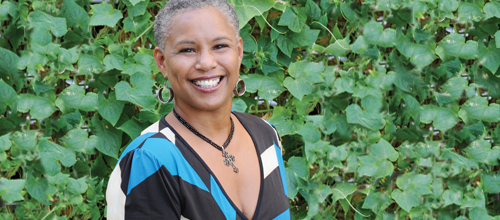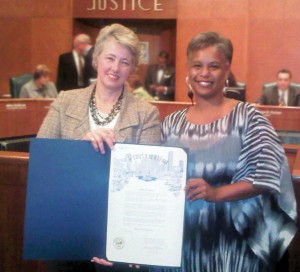A Champion of Change

Local HIV activist Dena Gray participates in White House HIV/AIDS roundtable
by Brandon Wolf • Photo by Yvonne Feece
Dena Gray is open about her HIV-positive status, but admits it’s tricky.
“The positive community feels like we’re being given rules to live by, to keep society safe,” says Gray. “Nationwide, the issue of informing a sex partner of one’s HIV status is still being fleshed through. For example, if we insist on using a condom, do we have to inform our partner? And if we don’t, will there be legal liabilities?”
For Gray, though, informing a partner is not an issue. “I tell my dates that everywhere I go, people know I’m HIV positive, and I ask if they can deal with that. Sometimes they can and sometimes they can’t.”
With amusement, she adds, “It’s a great way to weed out the ones who aren’t worthwhile. And when someone is hitting on me that I find annoying, I can usually get rid of them quickly by informing them of my status.”
The Diagnosis
Gray was 21 years old and a student at the University of Houston when she was diagnosed with HIV in 1991. She was majoring in communications, with an emphasis in public relations and African-American studies.
“By 1987, the drama around HIV was becoming very intense,” Gray remembers. “I was busy in school, active in a sorority, and in the student union. It was a shock to suddenly discover in 1991 that I was now a part of the whole scene that included Queer Nation and ACT-UP. Back then, young black heterosexual women just didn’t talk about AIDS.
“But the beauty of the thing was that right after I was diagnosed, I had an opportunity to take a class in AIDS anthropology,” Gray says. “I loved the class and learned a great deal about AIDS. One day the professor brought in a group of HIV-positive people to talk with us. Afterwards, I found someone my age, and to this day, we’re like sisters.”
From Victim to Career Activist
Gray’s new friend introduced her to AIDS Foundation Houston. Within a month, she was volunteering. Soon, she was asked to join the staff part-time, giving presentations in juvenile detention centers.
Gray remembers that in 1994 and 1995, the number of AIDS cases within the African-American community was beginning to grow larger and larger. “The community still wasn’t talking about it,” says Gray. “The numbers kept rising, but the community kept saying it wasn’t that bad. In 1999, the numbers had risen so high, we declared an AIDS state of emergency within the Houston African-American community.
“The biggest concern was men who were having unprotected sex with HIV-positive women. We even saw the rates of HIV in prisons going up,” says Gray.
Her next step into career activism was a full-time position at Bering Omega Foundation, where she directed activities in volunteer recruitment and community outreach. Later, she moved to the People with AIDS Coalition as director of advocacy. “I went from loving, hugging, and kissing to screaming and fighting,” she says with a smile.
Today, Gray serves as the HIV Prevention Program Manager for the City of Houston HIV/STD, Viral Hepatitis and Re-Entry Program. In this role, she works with the agencies that receive funding from the city for prevention.
The program has a $10 million budget, most of which comes from the Centers for Disease Control and Prevention. They also receive funding from state and other federal sources.
“We are responsible for 14 agencies, providing testing, referrals, and training of agency staff,” says Gray. “We do STD [sexually transmitted disease] tracking. When an agency identifies someone with a disease, we send out a disease intervention specialist to notify them and try to find out where they might have contracted the disease. Then we try to get that person tested and interrupt the spread of the disease.”
As the disease continues to spread, Gray’s group continues to find new ways of engaging communities with at-risk populations. One of those ways is through local churches.
“Churches have come a very long way,” Gray says. “They are offering HIV testing to their congregations on a regular basis. And they are having dialogues with their members.

“If a church calls me,” Gray explains, “we have to perform due diligence. We find out where they are at, in relation to discussing HIV. Not everyone is at the same place. By discussing the issue with them, before we visit, we can avoid a lot of drama.
“We also worked with activist Quanell X, the head of the New Black Panther Party,” says Gray. “For several weeks, we worked with him to host a big Friday afternoon ‘HIV blowout’ for different populations. There was a separate one for Muslims, Christians, the community, and GLBTs. We came out with a consistent message despite different affiliations.
“And today, Quanell and one of the gay men are like brothers. They had a chance to work through some crazy mess to get there. But ultimately they realized that they were both on the same side regarding the issue of HIV.”
A Champion of Change
The Champions of Change program, instituted by the Obama administration, brings together ordinary people from across America who are doing extraordinary things in their respective fields. The issues that have been addressed to date range from clean energy and fatherhood to immigrant integration and veterans. Dena Gray was named a Champion of Change and called to the White House to be a part of a roundtable on HIV/AIDS.
“I didn’t get much information about what I’d be doing in DC, so it was a bit of an adventure. But I did get a list of eight other people from across the country who would be joining me as Champions,” Gray says. “The night before I visited the White House, I Googled the name of everyone on the list and was amazed at who I would be meeting.”
The group included Cleve Jones, founder of the Names Project AIDS Quilt and a close associate of assassinated gay activist Harvey Milk. Also on the list was Dee Dee Ngozi Chamblee, whose close friend, transvestite performer the Lady Chablis, gained national attention playing herself in the film version of Midnight in the Garden of Good and Evil.
Champions Talked, the Administration Listened
The day began with a tour of the White House. “I had thought maybe we would be given awards and thanked, but that would be it,” says Gray. “Instead, we got to meet all day with Obama administration officials!
“Usually an HIV conference is single-issue driven, such as prevention or research. But this was a chance to bring up any issue—treatment, research, prevention, housing, etc. They asked us to tell them what was going on in the different populations that we represented,” says Gray.
“We sat down with Jeff Crowley, Director of the Office of National AIDS Policy, and Chris Bates, Executive Director of the Presidential Advisory Committee on HIV/AIDS. It was awesome. In my world, these guys are like rock stars. They are at the very forefront of what is going on in the HIV world.
“Every one of us was able to provide the administration with good feedback. We voiced our concerns and also offered our ideas for solutions,” says Gray.
“We were all familiar with the President’s Domestic AIDS Strategy, so we were able to speak to the parts of it that were strong, that we could take back and implement in our own ways with our own people.”
Gray explains that the President’s Domestic AIDS Strategy is comprised of four specific points: reducing new infections, increasing access to care and improving health outcomes for people living with HIV, reducing HIV-related disparities and health inequities, and achieving a more coordinated national response to the HIV epidemic.
The group praised the administration for lifting the ban on HIV-positive people entering the United States. Legal issues involving the sexual behavior of HIV-positive people were discussed, Gray says, including actions for which one can be arrested.
“Advocacy was a really big part of the conversations,” she says. “We need to reinvigorate the national response to HIV that existed in the earlier years of the epidemic. HIV is no longer seen as a mission; it’s now an industry.
“They took notes,” she adds. “That always impresses me when I’m talking and someone is taking notes about what I’m saying!”
After the day-long event, each participant was asked to write an entry for the White House website blog about their perspective on the meeting. In her blog entry, Gray wrote:
Going into the fourth decade fighting HIV will require a higher level of involvement, not just from the government, but from the people as well. With the steady increase in HIV among the nation’s youth and senior populations, we cannot afford to keep the blinders on and think that HIV cannot affect us or we can just take a pill.
SIDEBAR:
Commendable Change
Dena Gray was born in Beaumont, Texas. At the age of three, she moved to Houston with her then-single mother. She attended public school until the ninth grade, and then transferred to a small private school. “Then I took off for San Antonio to play volleyball for a year,” she says.
Briefly married, she is now the single mother of a 15-year-old daughter.
In addition to her work as the City of Houston’s HIV Prevention Program Manager, Gray serves on the Ryan White Planning Council and the American Psychological Association’s Committee on Psychology and AIDS. She has published essays in HIV journals and other publications.
Following her return from Washington, where she participated in the president’s Champions of Change program, Mayor Annise Parker presented Gray with a framed commendation awarded her by the Houston City Council.
The really big reward will come later this year. “We didn’t meet the Obamas during our visit, but all the Champions have been invited back for one big reception for all of us,” Gray says. “That’s when I will have the opportunity to meet the President and the First Lady personally.”
___________________________
SIDEBAR:
A Message from Brian Bond, Deputy Director of the Office of Public Engagement
[This past June marked] the 30th year of the HIV/AIDS pandemic, when the Centers for Disease Control and Prevention reported the first case of what would become known as HIV/AIDS. More than 50,000 people in the United States are infected with HIV annually, and today, more than 33 million people around the world are living with HIV.
Two million people across the globe die every year from AIDS. Over 600,000 fathers, mothers, daughters, sons, aunts, and uncles in this country have died due to this pandemic. . . .
The roundtable was intended to provide an opportunity for people living with HIV to reflect on their own lives and personal experiences as the nation reflects on what has been achieved over the last three decades. It is also an opportunity for us to continue shining a light on this pandemic. . . .
As someone living with HIV, this is very personal for me. . . . We are making progress—the number of new infections has declined among infants born with HIV and injection drug users, but we are now seeing rising infections in gay and bisexual men. Re-engaging the public, particularly the LGBT community, in prevention education and fighting stigma is crucial.
This anniversary is an opportunity to recommit ourselves to raising awareness about HIV/AIDS. We owe it to those that are no longer with us, and those like these “Champions” and the thousands like them that are fighting every day. We also owe it to the next generation.
Brandon Wolf is a frequent contributor to OutSmart magazine.











Comments